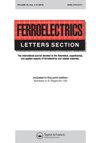A comparative investigation of structural and optical properties of annealing modified mullite bismuth ferrite
IF 1.3
4区 物理与天体物理
Q4 PHYSICS, CONDENSED MATTER
引用次数: 6
Abstract
Abstract Single phase Bi2Fe4O9 (Mullite BFO) nanoparticles were prepared first time by combustion method without using any solvent. Metal nitrates as oxidants and citric acid as fuel was used to synthesize Bi2Fe4O9 which were subsequently annealed at temperatures 550 °C, 600 °C and 650 °C. The impact of annealing temperature on crystal structure and physical properties are investigated by using X -ray Diffraction (XRD), Scanning Electron Microscopy (SEM), Electron Dispersion Spectroscopy (EDS), Ultra Violet Visible (UV–vis) spectroscopic studies and Fourier Transformed Infrared Spectroscopy (FTIR). X-ray diffraction confirmed orthorhombic phase of the Mullite BFO and peak profile analysis has been carried out to study the crystallite development in Mullite BFO nanoparticles. The Mullite BFO annealed at 600 °C showed minimum lattice strain. Further, the FTIR and UV-Vis spectra of the samples at room temperature confirm the formation of orthorhombic structure of the samples. Our results revealed that the band gap of Mullite BFO nanoparticles reduces with increase in strain and lowest band gap attained for strained mullite BFO annealed at 650 °C is 2.0 eV. The correlation of annealing temperature with calculated lattice and structural parameter of Mullite BFO nanoparticles was established. Magnetic measurements were carried out at room temperature up to a field of 30 kOe. All samples of Mullite BFO showed weak ferromagnetic behavior. Magnetic hysteresis loops showed a significant increase in magnetization for sample annealed at 600 °C.退火改性莫来石铋铁氧体结构与光学性能的比较研究
摘要首次采用燃烧法制备了单相莫来石(Bi2Fe4O9)纳米颗粒。以金属硝酸盐为氧化剂,柠檬酸为燃料合成Bi2Fe4O9,分别在550℃、600℃和650℃下进行热处理。利用X射线衍射(XRD)、扫描电子显微镜(SEM)、电子色散光谱(EDS)、紫外可见光谱(UV-vis)和傅里叶变换红外光谱(FTIR)研究了退火温度对晶体结构和物理性能的影响。x射线衍射证实了莫来石BFO的正交相,并进行了峰谱分析,研究了莫来石BFO纳米颗粒中的晶体发育。在600℃退火时,莫来石BFO的晶格应变最小。此外,室温下样品的红外光谱和紫外可见光谱证实了样品的正交结构的形成。结果表明,随着应变的增加,莫来石BFO纳米颗粒的带隙减小,650℃退火后,莫来石BFO的带隙最小为2.0 eV。建立了退火温度与计算得到的莫来石BFO纳米颗粒晶格和结构参数的相关性。在室温至30克的磁场下进行磁场测量。所有莫来石BFO样品均表现出弱铁磁行为。在600℃退火后,磁滞回线的磁化强度显著增加。
本文章由计算机程序翻译,如有差异,请以英文原文为准。
求助全文
约1分钟内获得全文
求助全文
来源期刊

Ferroelectrics Letters Section
物理-物理:凝聚态物理
CiteScore
1.10
自引率
0.00%
发文量
1
审稿时长
4.8 months
期刊介绍:
Ferroelectrics Letters is a separately published section of the international journal Ferroelectrics. Both sections publish theoretical, experimental and applied papers on ferroelectrics and related materials, including ferroelastics, ferroelectric ferromagnetics, electrooptics, piezoelectrics, pyroelectrics, nonlinear dielectrics, polymers and liquid crystals.
Ferroelectrics Letters permits the rapid publication of important, quality, short original papers on the theory, synthesis, properties and applications of ferroelectrics and related materials.
 求助内容:
求助内容: 应助结果提醒方式:
应助结果提醒方式:


